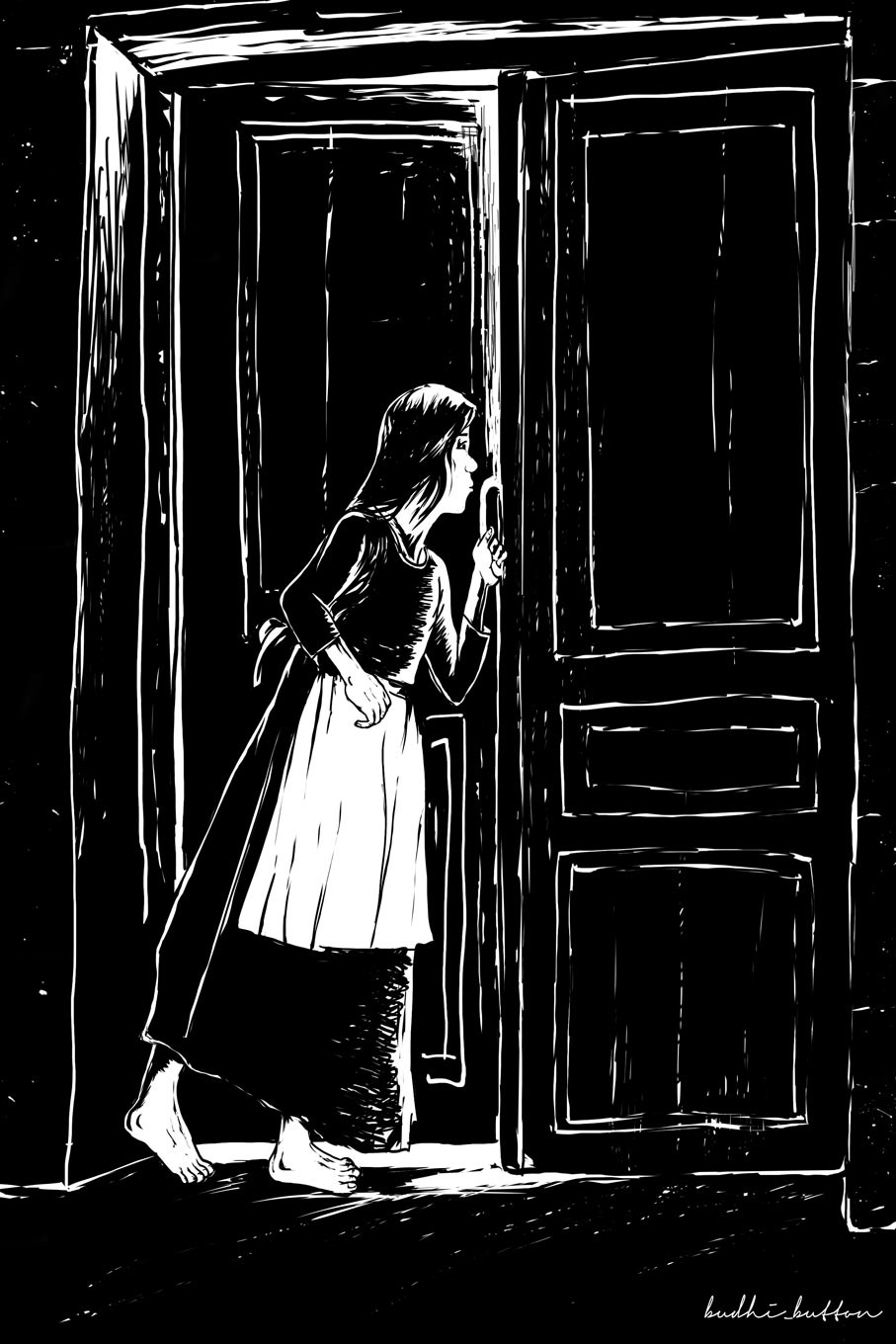Popular Reads
Top Results
Can't find what you're looking for?
View all search resultsPopular Reads
Top Results
Can't find what you're looking for?
View all search resultsShort Story: The helper's man
“Hey, Supiah, what’s the matter with you?” a loud, shrieking voice startles her, cracking holes in her daydream, her moment with the handsome prince.
Change text size
Gift Premium Articles
to Anyone
T
he nagging would come later. At the moment, the scene involves a setting sun, descending toward its place of retreat at the bottom of the sea. The waves rush to arrive at the beach for the very first time. White sparkling foam across the top of the waves are splattered against the rocks. Seagulls, squealing mid-air, swoop down to catch their prey through surprise attacks.
She is a beautiful princess. Her shiny and long black hair falls nicely down to her waist. She has a fair height; the shape of a goddess. Perfection in everything. And there is love in her eyes. There is a certain glow on her face. There is also sincerity, and kindness that sparkles like diamonds.
She looks a little worried as she looks out onto the sea. Her heart is pounding with anticipation. She is expecting someone. There is a deep, longing aura radiating from within her.
Then suddenly — why always so suddenly? — the long-awaited prince arrives. He bows and reaches out for her hands. It’s a magical moment of two lovers being reunited once more. The joy is palpable. The sun, it seems, descends slower upon the horizon.
“Hey, Supiah, what’s the matter with you?” a loud, shrieking voice startles her, cracking holes in her daydream, her moment with the handsome prince. Why does the blow always hits so unexpectedly? “You work too slow! Quickly chop those cabbages and cucumbers!”
The loud woman was busy moving about the small kitchen area of a Padang restaurant. She was a large, middle-aged woman who appeared too big to move around with ease. However, as the head cook at the busy restaurant, she was quite a fast-paced worker, a kitchen maestro who could do little but nag at everyone around her.
“Come on, what’s holding you, ha? It’s lunch time now, plenty of customers are coming. Mind your pace. Keep up. Don’t you know how to work?” the loud woman kept going, moving from one flaming wooden stove to another — stirring the bubbling hot chicken gulai and inspecting the pot of simmering beef rendang. Meanwhile, Supiah, who took her time to recuperate from the shattered daydream, quickly rushed to chop fresh cabbages and slice cucumbers even though there was already a mountain of chopped pale-green cabbages on the chopping board.
Supiah tossed them into a big plastic bowl nearby and continued to chop more cabbages. At a restaurant like this one, especially during rush hour for lunch or dinner, the demand for vegetables can create a significant pressure. Chopped cabbages or sliced cucumbers are the usual types of vegetables served in Padang dishes. The preparation is simple. The shredded cabbages and sliced cucumbers are soaked in boiling water, drained, and ready to be served fresh in an instant. Another type of vegetable is boiled young cassava leaves, sometime simmered with light gravy. Those are a lot easier to prepare compared to lodeh or gulai of raw jackfruits.
“More vegetables, Mak Inah, quickly! The stock is running out!” a waiter dressed in a light blue uniform shouted from the doorway which connects the dining room with the kitchen. The restaurant, as usual, was very busy.
“Ya, ya! Coming up!” Mak Inah shouted back in response, before hastily delegating orders: “Quick, Piah! More veggies! Take the ones that are ready to the front!”
At a regular Padang restaurant, shouting is expected — and the patrons don’t seem to mind it and continue to enjoy their meal. The restaurant is also typically divided into three major areas: the outer section, which is boxed in with glass walls, where various dishes on ceramic plates and bowls are stacked like a pyramid; the dining area where patrons would sit and enjoy their meals; and the kitchen where the meals are prepared for serving. Loud shouts are commonly heard between these three areas as servers try to navigate the hurdles of a rush hour.
Upon Mak Inah’s instructions, Supiah quickly took a big tin bowl containing a mountain of chopped cabbages into the dining area. Just as she was about to step past the doorway, the head cook called out to her again, even louder.
“What are you doing, Supiah? Why are you going in that direction?”
Supiah stopped moving and tried to think of where she was heading.
“Are you trying to spoil our good name? You want to show your ugly face to our patrons and get them to lose their appetite?”
Supiah gasped in regret. It wasn’t her place, of course. How could she have forgotten? She was not supposed to show her face to anyone in the dining area. So she turned around and put down the vegetable bowl on the table leaning against the wall by the connecting doorway. That was exactly the place. It was not her job to take anything past that doorway, especially during rush hours.
It was the job of the waiters and waitresses in uniform to take the vegetables and all other prepared meals from the kitchen to the dining area. It was a simple division of labor, actually: cooks and kitchen helpers handle the meal preparation and kitchen management; while waiters and waitresses in uniform serve the patrons.
Supiah made a fast return to her station. Her heart was still beating fast. While biting her lower lip, she immediately occupied herself with other chores. Focus, she thought to herself. She sliced a pile of onions thinly. They were to be fried until crisp to add flavor to the meals.
In the kitchen, Mak Inah has three helpers. Two are in charge of cooking, including Supiah, while the other is in charge of dishwashing and another at cleaning. It is not easy working at a busy restaurant. Each day, Mak Inah has to make somewhere between 15 to 20 dishes in bulk.
At the moment, Mak Inah stood with her left hand on her waist, sweating profusely, while her right hand was busy stirring up the lamb gulai on the burning stove. The act of stirring had to be repeated several times at certain intervals to make sure the coconut milk gravy stay thick and the meat moist. Otherwise, the gravy would become watery and the meat dry. Mak Inah wore a long scarf around her neck, the same scarf most other women would use to cover their hair. Everybody liked Mak Inah, except for her nagging mouth.
Supiah was an easy target. Even while she was busy cooking, Mak Inah would always find ways to belittle her or tease her. Some cooks like to listen to music while they do their magic at the stove; Mak Inah loves nothing more than to show her absolute authority in the kitchen.
“Supiah, what on earth gets into your head today? It’s always up in the clouds somewhere…” and so the nagging began. “Are you tired of working here? Do you want to quit?”
Supiah did not respond to the nagging, because it was better not to — no one ever responded to the nagging. However, Mak Inah didn’t stop there, “Do you think it’s easy to get work anywhere? Even many university graduates are now unemployed, let alone an uneducated person such as yourself. With your ugly face, your dark skin, and your skinny body — what are you going to offer? Think very hard about it. You should be thankful that you get to work with me. And what do I get? Gratitude?” Mak Inah scoffed. “No, not gratitude. All I get is your laziness and your tendency to leave your head up in the clouds. If it wasn’t out of pity, I wouldn’t have let you work here! But do you even realize that?”
Supiah swallowed hard the bitter taste in her mouth. It was an impossible situation for her. She owes Mak Inah almost everything — difficult as she is to work with, Mak Inah is the best cook in town. Everybody wants to taste her food. And she is the secret of this restaurant’s success.
“Do you think you can survive if you quit working here? If you have a husband, maybe yes. But, do you even have a man now, huh? Where would you find a decent man who is willing to marry you? Even a sickly old blind man would reject you. Never mind the younger ones. You won’t be a spinster like you are now if you had been lucky enough to find one. You don’t need to work in a hot dirty kitchen like this. Count your blessings, Piah! “
Supiah, again, could do nothing but tolerate the incessant bullying and berating. No beautiful, magical surprises would suddenly seize the moment to save her. Just the hot air, wood fire fumes, loads of work and Mak Inah’s endless nagging. While she tried hard to bear all the torment, the two other kitchen helpers busied themselves with their own tasks, trying to obscure their presence to invisibility. Clearly, even a clown wouldn’t dare to show up here; forget about the prince.
Supiah felt her hands stiffen, clutching onto that sharp knife, imagining what it would be like to slice her own heart into small cubes. Tears welled in the corner of her eyes. She remembered her old village where she had happily lived as a child; how she would spend the entire day playing by the beach. Her father, a fisherman, died at sea. He went fishing one night and there was a storm — her father didn’t make it home. After a long illness, her mother also died. She became an orphan at such a young age, and she had had to live most of her life at the homes of relatives who would take her. She was dependent upon the mercy of others, always. There was never a prince or a princess. Mak Inah is actually the closest person she has in the world who feels like family. The constant nagging is simply proof that life isn’t perfect, but it’s real. The fairytale, on the other hand, only exists up in the clouds.
***
Anwar writes short stories, poems and essays, lives in Jakarta.
--------------------------------------------------------------------------------------------------------------------------------------------
We are looking for contemporary fiction between 1,500 and 2,000 words by established and new authors. Stories must be original and previously unpublished in English. The email for submitting stories is: shortstory@thejakartapost.com
We are no longer accepting short story submissions for both online and print editions. New submissions to shortstory@thejakartapost.com will not be published.











